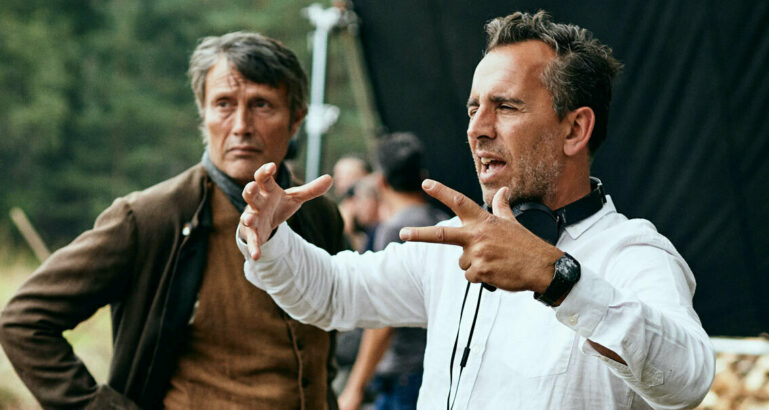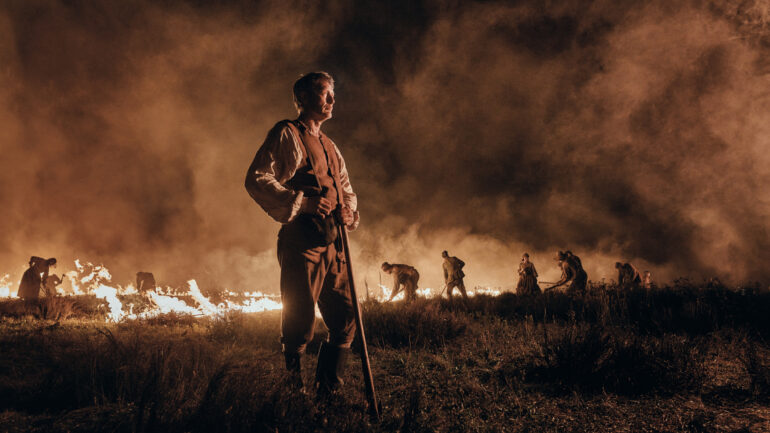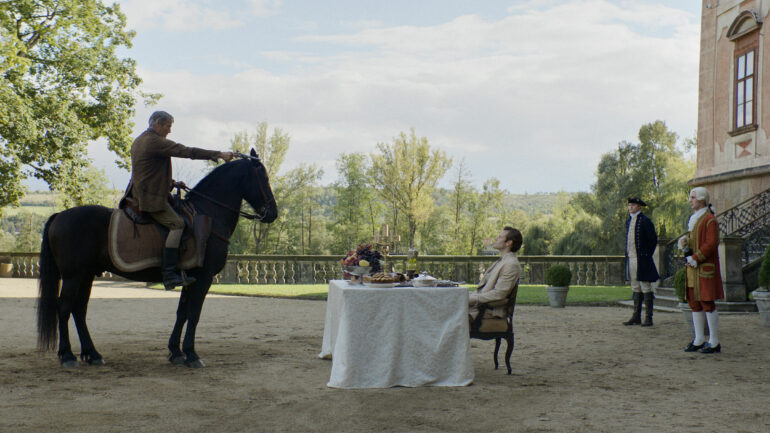Written by: Annika Pham
31.08.23
The Promised Land, Nikolaj Arcel’s large scale epic drama produced by Zentropa is world premiering in competition at Venice September 1st. We spoke to the Danish writer/director.
Last time a Danish film was vying for a Golden Lion was in 2014 with Joshua Oppenheimer’s The Look of Silence. Now Nikolaj Arcel will be competing against some of the world’s biggest names, from Michael Mann, Sofia Coppola, Agnieska Holland, Matteo Garrone to Yorgos Lanthimos.
Headlining his epic drama is Mads Mikkelsen, confirmed to set foot on the Lido’s red carpet.
With his script co-written with Anders Thomas Jensen (Riders of Justice) from Ida Jenssen’s 2020 best-selling novel ‘The Captain and Ann Barbara’, Arcel goes back to 18th century Denmark, which he successfully captured in the Oscar-nominated A Royal Affair.
Inspired by real events and set in 1755, the film follows the impoverished captain Ludvig Kahlen (Mads Mikkelsen), as he sets out to conquer the wilderness of the Danish heath to build a colony in the name of the King.
But the cruel local landlord Frederik de Schinkel (Simon Bennebjerg) believes this land is his. When de Schinkel learns that the maid Ann Barbara (Amanda Collin) and her serve husband (Morten Hee Andersen) have escaped and taken refuge at Kahlen’s, he swears revenge. The captain takes up the unequal battle, flanked by the family of outsiders that has formed around him.
The film produced by Louise Vesth for Zentropa, has received support from Nordisk Film & TV Fond. It is set to open in Denmark via Nordisk Film on October 5, 2023. TrustNordisk already pre-sold the epic to more than 50 countries.
Nikolaj Arcel spoke to us earlier this week.
First of all, how does it feel to attend Venice’s main competition?
Nikolaj Arcel: I was completely surprised. It is such an honour, when I see everyone else in official selection. I’m both nervous and excited. Also, I just love Venice. I’ve been there perhaps 15 times, so going there with my film will be amazing.
You haven’t directed a Danish film since A Royal Affair in 2012. Why were you tempted to go back to Denmark’s 18th century?
NA: Yes I’m going back almost at the same period, just 20 years earlier. One of the reasons is that I do love history, stories that are larger than life. I’m not attracted at all to what you call ‘Danish kitchen drama’. I therefore tend to look back at some of the most dramatic events that took place in Danish history.
That period in particular was fascinating. It was a world of extremes - different from today’s extremes. Society was very divided with on one hand farmers fighting to survive, out on the heath, and at the other end, aristocrats, living in their mansions and worried about what to wear with which wig etc. It’s nice to go back in time and use metaphors.
But to be honest, I didn’t deliberately plan to go back to that period. I simply loved Ida Jessen’s book ‘The Captain and Ann Barbara’ and fell for the characters. Ludvig Kahlen in particular is quite complex and that kind of complicated character’s journey is something that I hadn’t really tackled before. In my earlier movies, it was very much black and white, with heroes and villains. Here, there is a greyish area that was interesting to explore.
Yes this film is definitely a large scale epic, altogether raw, violent, poetic, emotional, even humorous. Do you feel this film is your most accomplished work to date?
NA: I think I’ve grown a lot emotionally since A Royal Affair. I had children and I think you can see that this film is also about family. It’s laughably obvious that I started to write this film with Anders Thomas right after I had my first child!
The story is about a guy, trying to figure out how to be a father, instead of just being a career person. It’s very personal.
Since I was 10 or 11, I’ve been obsessed with filmmaking, and I’ve spent almost 30 years just working and making movies. It’s just when I met my wife that I have mellowed. I didn’t realise how having kids can transform your life.
Next to the battle of good versus evil that Ludvig wages against de Schinkel, we have empowering female characters in Ann Barbara (Amanda Collin) and De Schinkel’s cousin Edel Helene (Kristine Kujath Thorp), which gives the film a contemporary edge. Was this also what attracted you to Ida Jenssen’s novel?
NA: For sure. Already with A Royal Affair, we tried to create a part for Alicia Vikander that was inspirational. Here, the character of Ann Barbara starts as an almost invisible housemaid, then she grows and grows until she becomes an amazing superwoman. All this was in the novel and it helped that it was written by a woman. We didn’t have to ‘invent’ female empowerment. It was already there.
Frederik de Schinkel is one of the best villains I’ve seen on screen. Was he as evil in the book?
NA: I would say he’s even worse in the book! What we added to his screen version is his kind of self-pity. He’s like a spoilt kid. He gets super mad when people don’t like him, when he’s not fully in charge. We were kind of inspired by Donald Trump.
Yes, Frederick was a horrible person. He is based on a true-life character, just as Ludvig.
How familiar are the Danes with those historical figures?
NA: Nobody really knew about them, until Ida Jenssen wrote her novel. Ludvig is almost completely unknown. I hope it will be less so, thanks to the movie.
Was it clear from idea stage that you would have Mads Mikkelsen in the title role?
NA: Yes, although with an actor of his calibre, you never know if he will be available. But it did help that we’re friends and had a great experience last time we worked together. So here, even before we wrote the script, he was keen to do it and we wrote the script with him in mind. I don’t know who could have played Ludvig as well as he does.
After Alicia Vikander and Mikkel Følsgaard who had their international breakthrough in A Royal Affair, international audiences will discover Simon Bennebjerg in a tour de force performance. Is it important for you to mix established and relatively new names?
NA: When I cast Alicia and Mikkel in A Royal Affair, they were simply perfect for their parts. Some people at the time said of Alicia-why choose her-she is unknown, she is Swedish and can’t really speak Danish. But I kept saying-look, she is just 10 times better than anyone else for that part. It turned out to be the right choice and she is now a huge star.
Because Denmark is so small, you often get 3-4 familiar actors in every film. With this film, next to Mads, I wanted to cast actors without too much baggage, that would surprise audiences. And of course, when those actors deliver great performances, it’s pure joy.
Could you describe your visual style and inspiration?
NA: I was inspired by the old epics from David Lean - Doctor Zhivago, Lawrence of Arabia. You watch these films today, and they are still astoundingly beautiful, almost haunting. We asked ourselves: what is it that makes them memorable? Usually it is about scope. Even with a close-up of Peter O’Toole, you can still see 1,000 camels behind. So we did something we had never done before which is to create that depth of field and sense of scale, in such a way that you can always see everything, nature, landscapes as part of every image.
It has really paid off. When I see the movie now, clearly it feels bigger than anything I’ve done before. The sprawling landscape is part of the storytelling.
How much preparation is necessary to achieve this? Do you do a detailed storyboard?
NA: Yes but it’s also linked to practical necessities. When you do a period film on a relatively tight budget - not on Scandinavian but on Hollywood terms - you really have to plan extremely well. It was the same with A Royal Affair. We shot 5-6 scenes a day. It was super intensive.
Working with your usual crew at the top of their game must be crucial…
NA: Yes. The DoP Rasmus [Videbæk] has worked on all my films. Usually Mikkel E.G. Nielsen cuts my films, but after he won an Oscar with Sound of Metal, he was very busy and couldn’t make it work. But then I don’t regret collaborating for the first time with Olivier Bugge Coutté. He cuts Joachim Trier’s films and has an arthouse sensibility that I really enjoyed.
What’s next?
NA: It’s a secret, but what I can say is that it will be another period piece, although with a very different story, and set in very different times. I’m starting to write the script with Anders Thomas.
Watch the trailer


